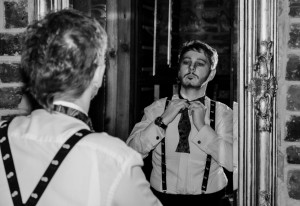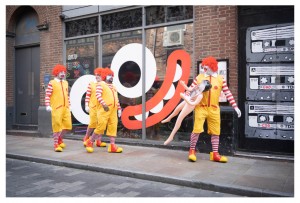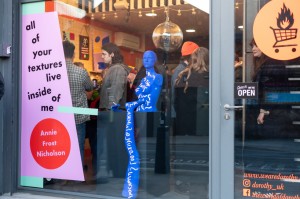In Profile: Ryan McClelland
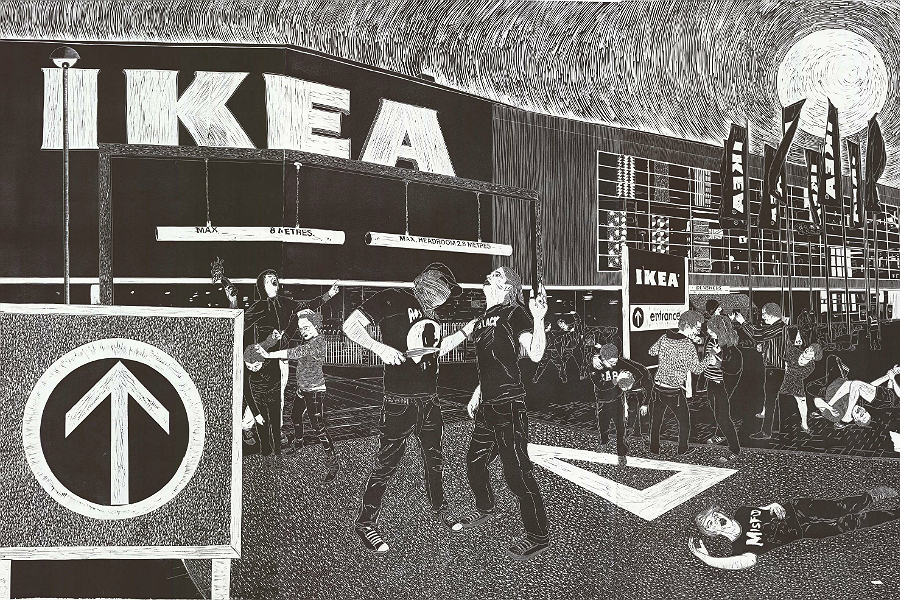
A two day only show opens at The Royal Standard this evening. Mike Pinnington catches up with one of the exhibiting artists, Ryan McClelland…
Artist Ryan McClelland is sat across from me in The Double Negative office, hurriedly finishing off a lunch of sandwich and crisps before cracking on with the interview. Hurriedly because he has to get back to The Royal Standard and complete his work ahead of tonight’s opening of group show, Rushing to Paradise.
This interview has been a while in the making, having known eachother for the best part of 20 years (we met in our teens in some of the scuzziest dives Liverpool had to offer). Since those days when he was studying at Hugh Baird College (having been brought up in Aintree), McClelland continued his education in London.
He has become increasingly well-travelled, in fact: this year alone he can count London, France and Ireland as exhibition destinations, making it all the more remarkable then that Rushing to Paradise will be his first Liverpool show.
Why now, I ask, and why has it taken so long for him to show in his home city? “I’ve always wanted to show in Liverpool and I suppose London becomes all encompassing. He continues, “there’s a better scene in Liverpool than there has been for a long time … [and] things seem very supportive.” There was also the added pull of friends (now Royal Standard directors) Fran Disley and Dave Evans moving to Liverpool, the three of them having studied together at the RCA.
“There was a conversation about doing an exchange with the Florence Trust,” where McClelland is coming to the end of a year long residency programme. “A mutual exchange: the idea is that we come up and make some work to show, they come down and do the same.” Then, with a wry smile, given the usual drink-soaked nature of private views, “and have an exchange of dialogue at the private view.”
I’ve always been interested in the idea that he’s very much an exile in London, so much so that it now seems to go without saying that the capital is as much part of his make up as his home town. I wondered what he thought about this, and whether his practice would be different had he returned home after his BA. “Post grad. and post MA are two very different points: “I think maybe if I returned after my BA at Camberwell, then maybe I wouldn’t have pursued art. One of the great things about being in London is having that opportunity and being spoilt for choice.”
‘Hang on, what?’, I think to myself. It had never occurred to me there had been a point he wasn’t devoted to the pursuit of being an ARTIST. Initially though, he admits that “I wanted to move to London and be part of what seemed like a very exciting art and music scene at the time. Then, I was very fortunate in that, when I did stay on I quickly got a really nice studio which I had for a few years – through being lucky I continued making work; I don’t think there was any question of me coming back after I finished my masters at the RCA in 2007″.
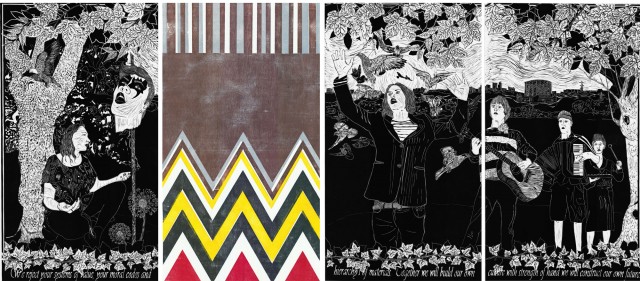
It was with the masters course that McClelland would develop some major momentum, elevating him to a position of relative prominence. “That was a really exciting time and I had a really good degree show, [I] sold a lot and had a lot of gallery interest.” He explains, “I was an artist who did really well from having that new young artists tag – there is a bit of a feeding frenzy in London around young grads. You want to take them to one side and tell them it’s not always gonna be like this.” Without a hint of envy, he adds, “they’re buying you ’cause it’s a lottery ticket.”
I know though, increasingly over recent years, there has been a possible return to Liverpool mooted. This is usually discussed over a beer and nostalgia, but today we’re in professional mode, as much as we can be. “Having worked this week at The Royal Standard, I do have thoughts of maybe one day moving back to the north west, and how that would work for me.” But, he says, “I think the real danger would be becoming a regional artist – it would be very easy to fall in to doing lots of local group shows with local artists and not having a dialogue with, y’know…”
The inference is that London, ever-hungry, would move on, forget him. “If I returned to the north west I’d probably make a pact with myself that I would do lots of travelling and show elsewhere.” He acknowledges though that the same traps exist everywhere: “Post RCA I had two or three years of loads of London shows and that gets a bit self-referential. You can get trapped in [the same circles]. I remember making a pact to pursue stuff outside London.” And then, “I’ve loved coming up this week.”
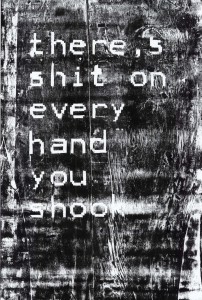
I ask how he would describe his practice and what he has been working on for The Rushing to Paradise show. Laughing, he says, “the area that I work primarily in is dilapidated craft and I think I, yeah, I originally studied ceramics because I think I’d been brought up with quite good working class, socialist ideals, and I saw it as a skill. I was a little bit alienated by fine art at college in Liverpool. But then y’know I moved to London … [where] all those YBA things had been bubbling away through the ’90s, and the Sensation show opened as I moved.”
Of those YBAs, he says it is Sarah Lucas who had most lasting impact on him and his work. “I can remember Sarah Lucas’ work particularly striking me, being 19, her work having a real good engagement with materials.” It is that engagement with materials which still informs: “I studied fine art and … ideas are first, everything else is secondary.” But, he says, “not far behind ideas is engaging with materials and what they can actually convey. I’ve evolved a weird mixed media practice, and I use a lot of different strategies to convey ideas. “In an age where everything is so slick … you question every image that you see because you think you’ve been lied to – there’s a real physicality of using materials.”
What can we expect from the new piece of work at The Royal Standard? “The piece I’m working on is a combination of text [and] image. I’ve had a hankering to work with fabric. I’ve always been very interested and inspired in American folk-art – quilt making, blankets, things like that; but also British trade union banners. I’ve been trying to bring more of the craft of fabric into the work … there’s a slightly hippy-dippy aesthetic.”
Not an obvious choice in the prevailing tendencies of contemporary art, I suggest. “It’s where a lot of the current work and research is based around. I’m interested in the idea of opting out. Opting out of a capitalist culture,” he counters. “That post-war generation, I liked the idealism that they had – although it was naive to a certain extent.” Also he says, “I got fed up of being told that [my work] was quite Gothic … and wanted to make work that’s more optimistic – making as a Utopian gesture is the tag-line, I tell myself.”
And with that, he polishes off the remains of his coffee. He has to go and get some fabric before returning to The Royal Standard to get back to finishing this latest piece of ‘Utopian dilapidated craft’.
Mike Pinnington
Rushing to Paradise opens this evening 6pm-9pm and continues tomorrow, 12pm-5pm



